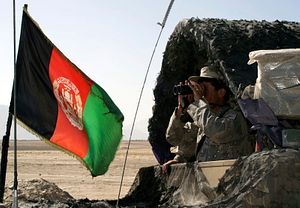Wednesday, the Afghan government signed a preliminary agreement with Hezb-e-Islami, a militant group led by one of the country’s most notorious warlords, Gulbuddin Hekmatyar.
Kabul is confident that the draft agreement will be finalized by both sides. First Deputy to Chief Executive Officer Abdullah Abdullah, Mohammad Khan, said, “We are optimistic about this agreement and we strongly support it.” But he noted, “This doesn’t mean it’s finalised.”
In April, Amin Karim–described by TOLOnews as “a high-ranking member of Gulbuddin Hekmatyar’s Hizb-e-Islami party”–said in an interview that the party was prepared to negotiate. One major sticking-point for negotiations between the Afghan government and Hezb-e-Islami–the issue of foreign troops in Afghanistan–seemed at the time to have been dropped. Karim told the Associated Press that the “departure of foreign troops is not a condition, it is a goal.”
And indeed, among the draft agreement’s three sections and 26 articles, the long-time demand for immediate withdrawal of foreign troops has been dropped. Khan, according to DW, “said the group’s demand that foreign forces leave Afghanistan was put on hold and that international troops would leave the country in agreement with the national government.”
As Reuters reports, the draft offers amnesty to Hezb-e-Islami members and includes stipulations for the release of prisoners. Hezb-e-Islami would be recognized as a political party but not included into the National Unity Government (NUG). In addition, the government would agree to work to get Hekmatyar and Hizb-e-Islami taken off UN terrorist blacklists.
Hekmatyar, an infamous character to say the least, has not weighed in personally on the negotiations. His whereabouts remain unknown.
While Hizb-e-Islami is a shadow of former self and decidedly smaller and less impactful than the Taliban, the NUG needs a win. As Aziz Amin Ahmadzai wrote for The Diplomat last week:
If the Afghan government reaches a political agreement with Hezb-e-Islami, the event would stand as perhaps the biggest success for the NUG since its formation in late-2014. The government can successfully include someone in the system who has not accepted the offers of different governments for the past four decades, which is true in the case of HIA and Hekmatyar.
Further, the inclusion of HIA will have salutary impact on Taliban. With their arrival to the political ground in Afghanistan, the Taliban might feel pressured and encouraged to join the political process too.
Others have noted the symbolic and political value of Hekmatyar “coming in from the cold” but cast reasonable doubts as to the actual impact on the battlefield. Ali M. Latifi and Shashank Bengali, writing for the LA Times, quote former interior minister Mohammad Umer Daudzai as commenting, “Hekmatyar has not been a major force in the war in quite a while.”
Hizb-e-Islami has engaged in attacks on Afghan government and coalition forces in the course of the present period of war, but is most reviled for shelling Kabul in the early 1990s. A 2008 article in the Washington Post cited ISAF estimates that there were Hizb-e-Islami 1,000 militants.
A successful accord will nevertheless be important and pioneer a path the NUG hopes the Taliban will take–however aspirational that hope seems to be.
The United States–which has played a part in attempts to get the Taliban to the negotiating table time and again–welcomes the deal with Hizb-e-Islami. U.S. State Department spokesperson John Kirby echoed the U.S. government line that it supports “an Afghan-led, Afghan-owned process for a negotiated solution” to the war and that “in this regard, we would welcome political negotiations that have been taking place [with Hizb-e-Islami].”

































